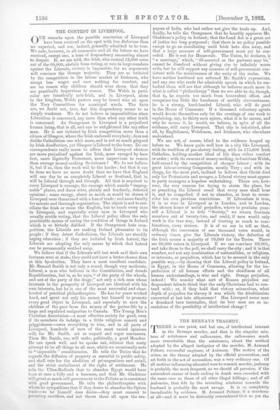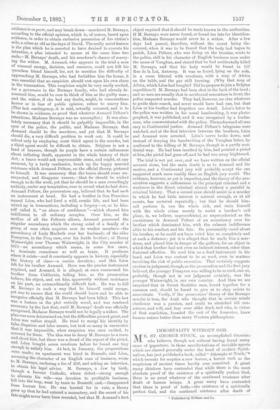THE BERNAYS TRAGEDY.
evidence is ex parte, and may break down—murdered M. Bernays, according to the official opinion, which is, of course, based upon evidence, in order to obtain exclusive possession of his victim's wife, a crime as old as the days of David. The really novel feature is the plan which he is asserted to have devised to execute his intention, a plan intended to secure at the same time two ends,—M. Bernays' death, and his murderer's chance of marry- ing the widow. M. Armand, who appears in the trial a man of unusual energy, decision, and resource, could not kill his quondam friend himself, for, not to mention the difficulty of approaching M. Bernays, who had forbidden him the house, it was essential that no suspicion should rest upon his own share in the transaction. This suspicion might be very easily excited, for a governess in the Bern aye family, who had already de- nounced him, would be sure to think of him as the guilty man ; and the widow, if she had any doubt, might, in conscientious horror or in fear of public opinion, refuse to marry him. (This last contingency, it is said, actually occurred, and is to be shown in evidence, as proof that whatever Armand Peltzer's intentions, Madame Bernays was no accomplice.) It wee abso- lutely necessary that it should be palpably Impossible, in the eyes of the police, the public, and Madame Bernays, that Armand should be the murderer, and yet that M. Bernays should die, a very difficult problem to work out. It could be solved only by employing some third agent in the murder, but a third agent would be difficult to obtain, Belgium is not a land of bravoes, though its people have a certain callousness about inflicting death, apparent in the whole history of their Art; a bravo would ask unprocurable sums, and might, at any moment, by a tardy confession, break up the happy married existence which Armand Peltzer, on the official theory, pictured to himself. It was necessary that the bravo should come un- suspected, and disappear unseen,—that he should be wicked enough to do the work, yet that he should be a man exceedingly unlikely, under any temptation, ever to reveal what Imbed done. Armand Peltzer, the prosecutors say, believed that he had such an instrument at hand. He had a brother in San Francisco named Leon, who had lived a wild, erratic life, and bad been mixed up in transactions, including a forgery—or, as he him- self called it, " an abuse of confidence "—which slowed him indifferent to all ordinary scruples. Over him, as the mother of all the Peltzers allows, Armand possessed the singular ascendancy which the strong mind of a family of a group of men often acquires over its weaker members—the ascendancy of Lady Macbeth over her husband; of the elder Fenayrou, in the Pecq case, over his feeble brother ; of Henry Wainwright over Thomas Wainwright, in the City murder of 1875—an ascendancy which seems, in some few cases, to dominate conscience as well as brain. It produces where it exists—and it constantly appears in history, especially the history of clans—a canine devotion ; and this Leon felt for his brother Armand. Here was the precise instrument required, and Armand, it is alleged, at once summoned his brother from California, telling him, as the prosecution believe, his object, and set him, apparently without resistance on his part, an extraordinarily difficult task. Ho was to kill M. Bernays in such a, way that he himself could escape, yet was to ensure that the world should know and be able to recognise officially that M. Bernays had been killed. This last was a feature in the plot entirely novel, and was rendered necessary by the fact that, until M. Bernays' death was officially recognised, Madame Bernays would not be legally a widow, The plan was soon determined on, but the difficulties proved great, and 116°11 was rather stupid. He tried to merge his identity by false disguises and false names, but took so many in succession that it was impossible, when suspicion was once excited, to account for them. The idea was to decoy M. Bernays to a room and shoot him, but there was a dread of the report of the pistol, and Leon bought seven revolvers before he found one tiny enough to satisfy him. At last, in January, the preparations were made; an apartment was hired in Brussels, and Leon, assuming the character of an English man of business, wrote to M. Bernays, enclosing a fee of £20, and asking an interview, to obtain his legal advice. M. Bernays, a Jew by birth, though a fervent Catholic, whose defect—strong enough to alienate his wife—was devotion to profitable business, fell into the trap, went by train to Brussels, and,—disappeared from human ken. He was hunted for in vain, a theory grew up that he had entered a monastery, and the secret of his fate might never have been revealed, but that M. Armand's first
object required that it should be made known to the authorities. If M. Bernays were never found, or found too late for identifica- tion, Madame Bernays would never be a widow. After a few days had passed, therefore, without the secret being dis- covered, when it was to be feared that the body had begun to perish, Leon Peltzer, who was living on the frontier, wrote to the police, still in his character of English business man under the name of Vaughan, and stated that he had accidentally killed M. Bernays, and that his body would be found in 157 Rue de la Loi, Antwerp. It was so found, lying on the sofa, in a room littered with revolvers, with a map of • Africa, on the table, and the gas still burning. (Why that map of Africa, which Loue had bought P Did he propose to join a Belgian expedition ?) M. Bernays had been shot' in the back of the head ; and as men are usually shot in accidental rencontres in front, the police suspected murder. They had, however, no clue whatever to guide their search, and never would have had one, but that Leon or his brother had forgotten one detail. Leon's letter to the police was written in his usual handwriting, it was photo- graphed, it was published, and it was recognised by a trades- man, who communicated with the police. Thenceforward all was easy to Continental justice. Armand Peltzer's telegrams were watched, and at the first interview between the brothers, Leon and Armand were arrested. Leon's nerve broke down, and instead of denying the handwriting of the Vaughan letter, he confessed to the killing of M. Bernays, though in a partly acci- dental way. He had been insulted by him, had pointed a pistol at him, the pistol had gone off, and lie had run away frightened.
The trial is not yet over, and we have written on the official account alone, but the main doubt is as to Armand and his motive, and a Continental jury will probably accept the one suggested much more readily than an English jury would. The evidence, however, as yet is imperfect, and the theory of the pro- secution suggests a callousness in the principal criminal and a weakness in the direct criminal almost without a parallel in criminal history. That a second man should assist in a murder in which he had little interest is natural enough, or at all events, has occurred repeatedly ; but that he should him- self perform it, run the whole risk, and stain himself with the whole crime merely to assist a brother's evil plans, is, we believe, unprecedented, as unprecedented as the coexistence in Armand Peltzer of an ascendancy over his brother which dominated him, with the calmest indifference alike to his conduct and his fate. He presumably cared about his brother, or he could not have ruled him so completely and at such a distance ; yet it is alleged that he male him a mur- derer, and placed him in danger of the gallows, for an object in which that brother had not even an indirect interest, other than fraternal affection. He used him as a dead instrument in his hand, and Leon was content to be so used, even in matters involving the risk of public execution. That certainly suggests caution in judgment,though, as the prosecution and the first jury believed, the younger Fenayrou was willing to be so used, and so, probably, though not in our judgment certainly, was the younger Wainwright, in our own country. And then we are surprised that in Secret Societies men, bound together for a common end, should be found to give or to obey orders to assassinate. Verily, if the prosecutors' theory of the Bernays murder is true, the Arab who thought that in certain minds obedience was a passion, and could be stretched till con- science, and will, and fear were alike dead, and who, in virtue of that conviction, founded the sect of the Assassins, knew human nature better than many Western philosophers.







































 Previous page
Previous page